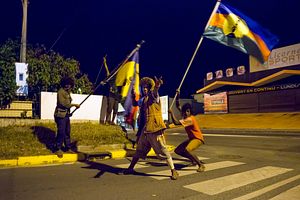On Sunday the people of the French Pacific territory of New Caledonia voted in a referendum that posed the question, “Do you want New Caledonia to gain full sovereignty and become independent?” The referendum had been promised as part the Noumea Accord, signed in 1998, to end a violent campaign by separatists from the indigenous Kanak people. The result of this weekend’s referendum was a victory for those who wish to remain part of France, with 56.4 percent (78,361 votes) voting to reject the proposition, against 43.6 percent (60,573 votes) in favor of independence. Turnout was 80.6 percent of the eligible public. The Diplomat spoke to Alexandre Dayant from the Lowy Institute about the implications of the vote.
Predictions prior to the referendum forecast a victory for the “No” campaign of 60 percent or above, yet the final result was far less decisive. What do you think was the reason for this discrepancy?
For the pro-independence supporters, the result of yesterday’s vote is a very good outcome, and gives them a strong argument to continue the struggle for independence. Indeed, under the Noumea Accord, France agreed to holding three opportunities to say “Oui” to independence, with two more referendums due in 2020 and 2022. It seems that the pro-independence campaign was more effective than what had been expected in the pre-polling.
On the loyalist side, however, the victory is bittersweet. Previous polls were projecting a large victory – up to 70 percent – for the “Non” vote. With such a majority, anti-independence parties had hoped to force the separatists to abandon the holding of the second and third referendums and to convince the state to support them in this process. With the publication of the closer than expected result, these aspirations are less realistic. To me, it looks like, for many loyalists, a win of the “No” vote was a given. As such, while participation in the referendum was just above 80 percent, it seems like those in the loyalist camp were the ones to stay home.
With the result being closer than expected, would this create the conditions for a further devolution of powers from Paris to Noumea? Would actors in the independence movement be placated by greater autonomy, or is independence their only goal?
The simple answer is no. The Noumea Accord doesn’t stipulate any additional power to be ceded to Noumea. By rejecting independence, New Caledonia remains a French territory, with Paris continuing to hold the sovereign powers (defense, foreign affairs, currency, justice, and public order) of New Caledonia. But the result, closer than expected, opens the door to two new referendums. As such, it is expected that both sides will continue their campaigning, while the French government keeps its neutral position.
Does France have the capability to provide a greater sense of belonging within the indigenous Kanak population, or is the desire for independence within this group beyond the reach of Paris?
Yesterday’s referendum was the result of a process that started 30 years ago, with the signing between pro- and anti-independence [groups] of the Matignon Accords (1988) and Noumea Accords (1998), peace agreements that ended years of violence, backed by distinct ethnic divide, on the territory. As such, it seemed that the entire policy life on the islands had been defined by the binary question of the referendum. To me, it seems difficult for the French government to reach the Kanak population, as their conviction is very well rooted into their culture.
However, today’s discussion between both parties and the French government will inevitably call for the continuation of the decolonization efforts that began 30 years ago. Today, social inequalities remain marked and the indigenous Kanak population face significant challenges: higher unemployment rate, delinquency, school dropouts, etc. How both sides of this campaign will be able to unite to close the gap between the “Caldosh” (ethnic Europeans) and Kanaks, regardless of the referendum outcome, remains to be seen.
The Noumea Accord created the agreement that three referendums will be held on the subject of independence, with two more scheduled for 2020 and 2022. Do you think that either of these two votes have any chance of success? Could conditions in the country shift in this period of time to influence the result?
Sunday’s result was a surprise to me. I did not expect the result to be so good for the pro-independence vote. The polls didn’t either. Given how close the result was, it is easy to forecast a growing trend of the pro-independence movement.
However, I believe this close vote could also be a wake-up call for the anti-independence party. Protecting the status quo is not enough anymore, and building a strong argument will be at the core of the loyalist campaign, from now on.
Were the independence movement be successful in either of these future referendums, what would this mean for the French military presence in the Pacific? Would independence forces wish to see this presence removed from New Caledonia?
France has recently explained what a “Yes” and “No” vote would mean for New Caledonia. If there is a “Yes” vote, the French government states that “the new structure of public powers resulting from the accession to independence will not enter into force on the day after the referendum. France (…) will not abruptly withdraw. Security, public order, public finance, and the justice system will be maintained by France for a transitional period following the consultation.”
It is indeed crucial for an independent New Caledonia to protect its EEZ (Exclusive Economic Zone), and having the French military by their side would be of a great help, for a start. But for the long term, it is still difficult to say.

































